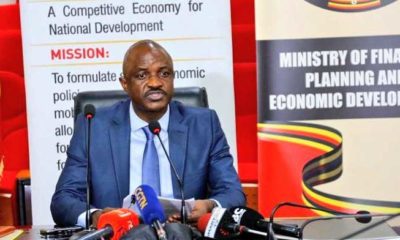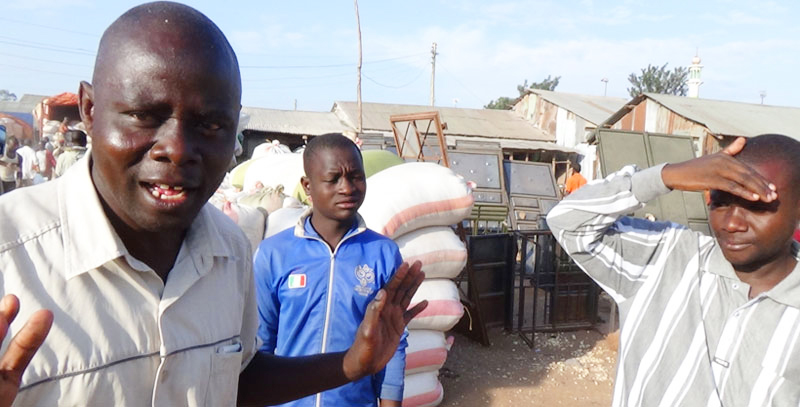Opinions
Why the economy is dying
The disciples of “casino economics” continue doing the same things over and over again hoping for different results. Einstein calls it insanity!
Few, a rich mineral base, and lakes and rivers which provide abundant fresh water and fish, Uganda has historically been referred to as the Pearl of Africa.
Yet we cannot provide our people with adequate nutrition. We have failed to produce items as simple as toothpicks; someone calling himself a businessman has to board a plane and go to China to import sharpened pieces of wood to enable us clean our teeth after eating chicken imported from as far as South Africa.
I have written about these issues before. What I wanted to add on today is the evidence to our tragedy that is before us but we seem either not to see it or to take it for granted. Mr. President, and fellow Ugandans, we all drive on Uganda’s most important road — the road to the Kenyan boarder, popularly known as Jinja Road.
As we drive on this road, I request that we observe its state, particularly the section between Kireka and Namanve. Jinja road summarises Uganda’s economic tragedy. The country’s trade balance is engraved within the tarmac on Jinja road.
The side heading to Jinja, and by extension to Mombasa, is smooth. On the other hand, the side heading toward the city, from Mombasa, is curved in with ridges in the middle. The reason is simple; the trucks that drive towards Mombasa make no damage to the road because they go empty, but on their way back they ferry heavy merchandise.
That is exactly how Uganda’s economy is structured. It is constructed to import more than it exports. So the trade balance of the country is engraved in the country’s main road to the sea!
Many Ugandans today are concerned about the worrying state of their economy. This week I attended several public debates about the economy. But everywhere I went people, including economists, were worried about where the economy was heading.
What can Uganda sell?
At one of the dialogues I attended, discussing a report entitled, “Industrializing through trade” authored by UN’s Economic Commission for Africa. The UN was selling the idea that African countries could expedite industrialisation through trade. The first question the participants asked the representatives of the UN was, “Trade in what?” What does Uganda have to sell?
I started writing this column in 2006. Since then, every single week I have been amplifying the various questions the people of Uganda ask themselves nearly on the daily basis and whoever they can chance on.
They ask; why does the shilling repeatedly depreciate against major currencies of the world? Why do prices for items such as oil in Uganda tend to be irresponsive to global trends?
Why is Uganda unable to manufacture products that require basic technology and/or skills, to the extent that the country imports simple items such as toothpicks, candle wax, bathing sponge (ekyangwe), popcorns and many other basic items?
In the course of my career as teacher of Ugandan economy and also as a writer and policy analyst, I have encountered so many people asking those, and many other related questions.
I have attempted to answer them in this space over the last 8 years, complete with well articulated policy recommendations. Yet the disciples of “casino economics” — the brand of economics that has been going on in Uganda for some time now, continue doing the same things over and over again expecting different results. Albert Einstein calls it insanity.
My personal experiences, first as a student at Makerere University, both for my first and second degrees, and also through interactions with a cross-section of people including some of the top economic advisers of government and leaders, have given me the idea why most of the African economies are in the shape they are in.
Specialists in defining the problem
At Makerere, I was taught by some of the smartest economists this country has had. However, later in my working time, I realised that much of the economics they had taught me, apart from making me sound more sophisticated and also enabling me to master the various interesting economic concepts and theories, was not the brand of economics that works for a developing society such as Uganda.
We are taught economics that whose theoretical underpinning are meant for the developed economies — economies with well built institutions, markets, and other requisite institutional infrastructures. After Makerere, we go to Chicago, Oxford, or New York for our graduate degrees. We master the art of deriving complex econometric models and optimization equations.
In most of the graduate schools where we go, they train us to become market fundamentalists. When we return and sign contracts with government, we buy designer suits and iPads, sit in air-conditioned offices at Finance and/or Bank of Uganda, perfect our econometric skills, and write some research papers.
We keep our networks that we created while at the graduate schools in Europe and America to connect us to the various research and economic advocacy agencies out there, where we fly regularly to present our research findings.
Interestingly, most of the research we do is about the very issues we are employed to sort out. But instead conducting the research to help us solve the economic problems such as the depreciating shilling, the widening trade balance, the high lending rates banks charge our people etc, we specialise in defining these problems and making recommendations impractical for Uganda’s economy.
When we come back from the conferences where we present the papers, having earned our per diem, we construct a few apartments on the hills of Kampala which the President often mentions in his State of the Nation Address to show how the economy is performing wonders.
In the meantime, whenever someone asks us to do something about the various economic challenges mentioned above, we say, “The market will sort them out; don’t interfere with them and don’t engage in policy reversal.”
This is the story of our situation. Alright, the same market fundamentalists presided over a period of impressive performance of the economy. GDP grew, inflation was contained, banks came and lent us money, investors came and rolled out some big investments, government collected tax revenue, etc.
However, these “impressive” outcomes arguably conceal more than they reveal. Empirical studies, for example, have found that Uganda’s growth profile has remained jobless. The economy is growing without creating jobs.
We need change
Research has further indicated that the economy has failed to undergo socio-economic structural transformation. Although it has experienced sectoral shifts in GDP composition with services emerging as the dominant contributor to GDP (53%) followed by industry (25%), there was no sectoral shifts in employment.
Nearly 80% of the population remains stuck in agriculture, a sector whose contribution to GDP has reduced to about 20%. Income inequality has increased, household incomes have stagnated, and some social indicators have reversed.
Yet whenever called upon to intervene and correct these visibly clear challenges, the economic authorities, mandated by the law to regulate the economy say, “Uganda’s economy is a free market economy; we have nothing to do about that.”
To them, it’s okay for banks to offer 3% to savers, yet target inflation rate is 5%. And when a friend to the very “saver” goes to the bank to borrow his friend’s savings, the bank charges him 23%. When Uganda’s ask the economists at Bank of Uganda to help them reduce the rates, they simply tell them the rates are high because of structural factors, as if that is what Ugandans were asking for!
The good doctors of philosophy in economics often sit in television and radio studios to defend full liberalisation of the capital account, despite the clear instability it has caused in the foreign exchange market arising from variability in capital flows.
When an informed caller tells them what other neighbouring countries are doing, using second-best alternative policies to mitigate the problem, the experts sing their favourite slogan, “One size does not fit all,”
In June this year, we had a debate on these issues here in Kampala where among other important recommendations, participants agreed that there was an urgent need for a change in the personalities that run Uganda’s economic apparatus.
“The people who managed the failed parastatals in the 1980s are still in charge of the economy,” one participant wondered.
The participants also agreed that there is urgent need to shift the debate from what the reforms have achieved or where they have failed, to what needs to be done to move the economy from stabilisation to growth and development. Is it difficult to see why?
Comments


























